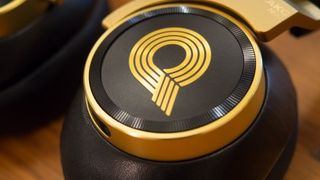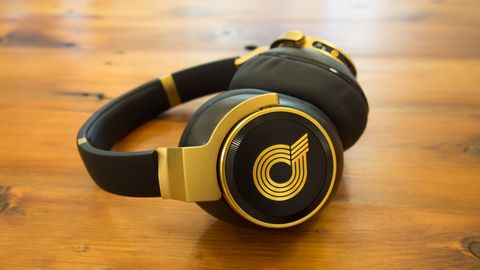Why you can trust TechRadar
AKG nailed the first impression and the unit, for packing in so many functions, are fairly intuitive to use. So, how does the N90Q sound? In one word, spectacular.
But I think I'll need to use a few more. Out of the box, these headphones work wonders on your music collection without any equalizer tweaks. But, thanks to the active noise cancellation (ANC), full treble and bass control and the unique TruNote tech, the N90Q will make your music sing like you've likely never heard.

Let's start off by mentioning that every feature of these headphones feeds off the battery. So when it's dead, the music stops. Powering on the N90Q automatically triggers the ANC, which I'm pleased to say doesn't damper or negatively impact the sound whatsoever.
From there, you'll want to press and hold the calibration button for five seconds. It'll beep and boop, but under the hood, it's calibrating the headphones by using the outside noise to create an optimum frequency to cancel it out between the 52mm drivers and your ears. It's a bit of a process compared to other headphones that only require a flick of a switch to get things started, but it's worth it.

Once you get started listening, you can adjust the left dial to add bass and treble, or rotate it the opposite way to remove it. If you still aren't getting the desired effect, you can tap the calibration button to cycle between three sound stage presets.
This is no doubt the N90Q's coolest feature.
First off, there's the standard setting, which offers up the tunes in an unaltered state. Then, there's the studio preset, which is said to deliver your music as its producers intended. Lastly, there's the surround sound setting, which sounds similar to the studio effect, but extends the size of the stage vastly.
There's a setting that suits every genre of music I threw at it and each can be enjoyed distortion-free through the N90Q. These headphones even come stocked with a built-in digital-to-analog converter (DAC), so you can hook these up to a PC for lossless listening if you have the necessary hi-res audio files.

Listening to music with the N90Q, while amazing to the ears, isn't as kind to the top of your head. In my experience, adjusting the earcups down too low made the headband grind into the top of my head after about 20 minutes of use. Thankfully, a quick re-adjustment helped considerably.
As for battery life, during testing, which consisted of over 15 charge cycles, the battery lasted anywhere between 10-13 hours each time. Not too bad, considering that it's powering such a grand experience along with ANC, but you'll want to make sure that you keep the included power bank with you. Also, the inline controls and microphone work just like you'd assume they would. It's all easy to use and voice quality is completely serviceable.
Final verdict
This section of the review is where I tell you whether, based on everything that I've said so far, the product is worth your money. I've asked readers before to trust me on a verdict of a pricey item (see: Sennheiser Momentum Wireless) but this takes things to another level. The AKG N90Q are three times the cost of Sennheiser's amazing wireless headphones, which I truly love. If you're feature-crazy, the Parrot Zik 2.0 will keep you plenty entertained for around the same price.
When things are two or three times the cost of another, similar item, be it toilet paper or audiophile-grade headphones, the expected question is: is it two or three times better than the cheaper one? To answer that question for the N90Q, yes.
But should you buy them? That's a harder question to answer. These headphones try, and succeed, at a heck of a lot. At half the cost, I'd be more likely to recommend these excellent headphones. But at its current (punishing) price, you'd be better off looking elsewhere for your audiophile needs.
Cameron is a writer at The Verge, focused on reviews, deals coverage, and news. He wrote for magazines and websites such as The Verge, TechRadar, Practical Photoshop, Polygon, Eater and Al Bawaba.


